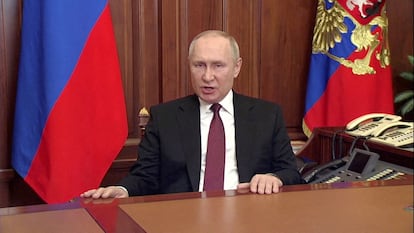Russian president puts nuclear deterrence forces on ‘special mode of combat duty’
Delegations from both sides in the Ukrainian conflict have agreed to negotiations on Belorussian territory

Russian President Vladimir Putin on Sunday ordered his military to put his country’s nuclear deterrence forces on “special mode of combat duty.” Speaking at a meeting on Saturday with the heads of his armed forces, he said that “senior officials of the leading NATO countries are making aggressive statements against our country. Therefore, I order the defense minister [Sergey Shoygu] and the chief of the general staff [Valery Gerasimov] to transfer the deterrence forces of the army in Russia to a special mode of combat duty,” he stated.
By way of response, Putin received a “yes” and a nod of the head from both of his military chiefs. Subsequently, the Russian president accused the West of adopting “illegitimate actions” against his country in the form of sanctions. The latest of these measures include the disconnection of a number of the country’s principal banks from the Swift international payment system, among others.
During his televised statement, Putin justified his latest actions by pointing directly to the sanctions approved by the West and the “aggressive” statements made by NATO member states.
As part of negotiations held in recent months with the United States and NATO, Putin warned on a number of occasions that he would adopt “military-technical measures” if the talks failed and his main demands were not met, such as expelling all of the NATO members incorporated from 1997 onward, including the Baltic states, Poland and Romania.
One of these responses is already well known: the invasion of Ukraine by Russia that began earlier this week. Another step that has concerned the West is the possible deployment of nuclear weapons in Belarus, a country whose leadership has called a constitutional referendum that, among other things, would allow for the legal deployment of Russian missiles in its territory.
The Belarusian president, Alexander Lukashenko, has proposed this measure on occasion, but it has until now been rejected by the Kremlin.
Russian strategic containment forces include its entire nuclear arsenal, such as intercontinental missiles, missile defense systems and non-nuclear strategic forces. The latter include long-range bombing and submarines, surface vessels and aircraft that can carry conventional weapons, according to the Defense Ministry.
At the same time that Putin was making his announcement, it emerged that the Russian and Ukrainian authorities had agreed to negotiate a way out of the conflict. The spokesperson for the Russian president, Dmitry Peskov, announced on Sunday that a delegation from the Ukrainian government of Volodymyr Zelenskiy was on its way to the Belarusian region of Gomel, near the border with Ukraine, where representatives from the Kremlin were waiting.
Tug of war
The initiative moved forward after a tug of war over the location of the meeting. The negotiations began on Friday with the mediation of Lukashenko’s government. Kyiv wanted to hold the talks in Poland, while Moscow was opting for Belarus, where peace agreements were signed in 2014 and 2015 to bring an end to the war in the east of Ukraine with pro-Russian separatists, supported financially and militarily by Moscow.
President Zelenskiy stated via his Telegram channel that he had held a conversation with Lukashenko, and that minutes later, he had confirmed that there would be a meeting between the two sides with no conditions. After four days of the Russian offensive, at least 198 people have lost their lives on Ukrainian soil, while more than 360,000 people have crossed the border in a bid to flee the violence.
Tu suscripción se está usando en otro dispositivo
¿Quieres añadir otro usuario a tu suscripción?
Si continúas leyendo en este dispositivo, no se podrá leer en el otro.
FlechaTu suscripción se está usando en otro dispositivo y solo puedes acceder a EL PAÍS desde un dispositivo a la vez.
Si quieres compartir tu cuenta, cambia tu suscripción a la modalidad Premium, así podrás añadir otro usuario. Cada uno accederá con su propia cuenta de email, lo que os permitirá personalizar vuestra experiencia en EL PAÍS.
¿Tienes una suscripción de empresa? Accede aquí para contratar más cuentas.
En el caso de no saber quién está usando tu cuenta, te recomendamos cambiar tu contraseña aquí.
Si decides continuar compartiendo tu cuenta, este mensaje se mostrará en tu dispositivo y en el de la otra persona que está usando tu cuenta de forma indefinida, afectando a tu experiencia de lectura. Puedes consultar aquí los términos y condiciones de la suscripción digital.








































